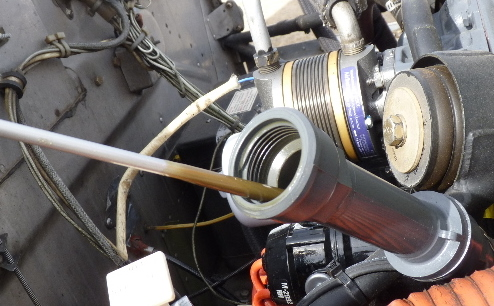The oil system in an aircraft is integral to keeping the
engine running since it lubricates the engine’s many moving parts, removes
contaminants, prevents corrosion, cools the engine and cylinders, and creates a
seal between the pistons and cylinder walls (PHAK, 2016). To give a simple and
basic explanation of the oil system, it works by having the oil flow through
the strainer screen in the oil sump. The strainer screen filters out any
particles in the oil that could flow through the system and cause damage. The
oil then passes through a pump before going to either the oil cooler or oil
filter. If it is hot and needs to be cooled down, this is when it goes to the
oil cooler. On the other hand, if the oil is cool enough, it goes to the oil
filter where the lingering contaminates get filtered out that the strainer
screen did not get before. After this process, the oil goes to the engine to
cool, clean, and lubricate (Aircraft Systems, 2016). The oil system is monitored by the oil temperature gauge and the oil pressure gauge. The oil pressure gauge shows the pilot the pressure of the oil being supplied to the engine, while the oil temperature gauge shows the temperature of the oil.
One of the most important parts to this system is the oil
cooler. If it were to malfunction, the engine would no longer be cooled
internally by the oil. This could lead to engine damage such as the scoring of
the engine’s cylinder walls, warping the valves, and damage to the pistons and
rings, leading to a loss of engine power and detonation (PHAK, 2016). Another
issue with the loss of the oil cooler is that as oil heats up it becomes less
viscous, thus causing the bearings to have more friction. It is important that the
pilot monitors the temperature gauge to see if there is any excess oil heat and
to replace the oil cooler when necessary since it can become less efficient
over time due to carbon built up.
By monitoring the oil system gauges and doing the proper preventative and scheduled maintenance,
such as oil changes and cleaning of the strainer screen, the deterioration of
the oil system can be decreased and will be able to keep the engine’s performance
optimal.
(Word count: 411)
Aircraft Systems - 06 - Oil System. (2016, September
9). YouTube. Retrieved July 22, 2022, from
https://www.youtube.com/watch?v=cWDCXFwPLIs&list=PLzW-Ub1FWeZzdOHQhNK0U0Ci1a-VRH8IO&index=38
Federal Aviation Administration. (2016). Pilot’s Handbook
of Aeronautical Knowledge (PHAK). Retrieved July 22, 2022, from
https://www.faa.gov/regulations_policies/handbooks_manuals/aviation/phak/.





No comments:
Post a Comment